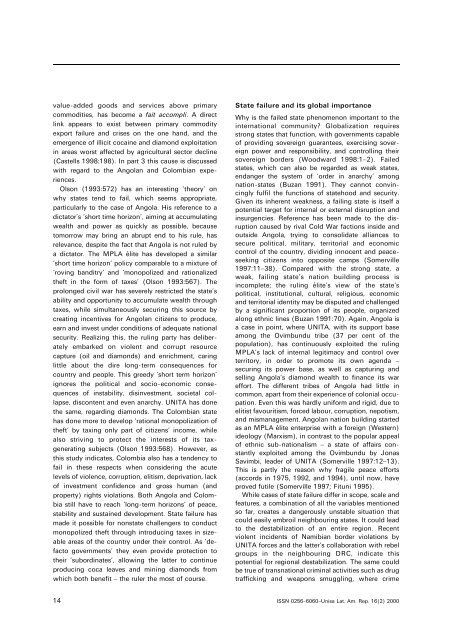pdf: 6.426kb - University of South Africa
pdf: 6.426kb - University of South Africa
pdf: 6.426kb - University of South Africa
Create successful ePaper yourself
Turn your PDF publications into a flip-book with our unique Google optimized e-Paper software.
value-added goods and services above primary<br />
commodities, has become a fait accompli. A direct<br />
link appears to exist between primary commodity<br />
export failure and crises on the one hand, and the<br />
emergence <strong>of</strong> illicit cocaine and diamond exploitation<br />
in areas worst affected by agricultural sector decline<br />
(Castells 1998:198). In part 3 this cause is discussed<br />
with regard to the Angolan and Colombian experiences.<br />
Olson (1993:572) has an interesting `theory' on<br />
why states tend to fail, which seems appropriate,<br />
particularly to the case <strong>of</strong> Angola. His reference to a<br />
dictator's `short time horizon', aiming at accumulating<br />
wealth and power as quickly as possible, because<br />
tomorrow may bring an abrupt end to his rule, has<br />
relevance, despite the fact that Angola is not ruled by<br />
a dictator. The MPLA e lite has developed a similar<br />
`short time horizon' policy comparable to a mixture <strong>of</strong><br />
`roving banditry' and `monopolized and rationalized<br />
theft in the form <strong>of</strong> taxes' (Olson 1993:567). The<br />
prolonged civil war has severely restricted the state's<br />
ability and opportunity to accumulate wealth through<br />
taxes, while simultaneously securing this source by<br />
creating incentives for Angolan citizens to produce,<br />
earn and invest under conditions <strong>of</strong> adequate national<br />
security. Realizing this, the ruling party has deliberately<br />
embarked on violent and corrupt resource<br />
capture (oil and diamonds) and enrichment, caring<br />
little about the dire long-term consequences for<br />
country and people. This greedy `short term horizon'<br />
ignores the political and socio-economic consequences<br />
<strong>of</strong> instability, disinvestment, societal collapse,<br />
discontent and even anarchy. UNITA has done<br />
the same, regarding diamonds. The Colombian state<br />
has done more to develop `rational monopolization <strong>of</strong><br />
theft' by taxing only part <strong>of</strong> citizens' income, while<br />
also striving to protect the interests <strong>of</strong> its taxgenerating<br />
subjects (Olson 1993:568). However, as<br />
this study indicates, Colombia also has a tendency to<br />
fail in these respects when considering the acute<br />
levels <strong>of</strong> violence, corruption, elitism, deprivation, lack<br />
<strong>of</strong> investment confidence and gross human (and<br />
property) rights violations. Both Angola and Colombia<br />
still have to reach `long-term horizons' <strong>of</strong> peace,<br />
stability and sustained development. State failure has<br />
made it possible for nonstate challengers to conduct<br />
monopolized theft through introducing taxes in sizeable<br />
areas <strong>of</strong> the country under their control. As `defacto<br />
governments' they even provide protection to<br />
their `subordinates', allowing the latter to continue<br />
producing coca leaves and mining diamonds from<br />
which both benefit ± the ruler the most <strong>of</strong> course.<br />
State failure and its global importance<br />
Why is the failed state phenomenon important to the<br />
international community? Globalization requires<br />
strong states that function, with governments capable<br />
<strong>of</strong> providing sovereign guarantees, exercising sovereign<br />
power and responsibility, and controlling their<br />
sovereign borders (Woodward 1998:1±2). Failed<br />
states, which can also be regarded as weak states,<br />
endanger the system <strong>of</strong> `order in anarchy' among<br />
nation-states (Buzan 1991). They cannot convincingly<br />
fulfil the functions <strong>of</strong> statehood and security.<br />
Given its inherent weakness, a failing state is itself a<br />
potential target for internal or external disruption and<br />
insurgencies. Reference has been made to the disruption<br />
caused by rival Cold War factions inside and<br />
outside Angola, trying to consolidate alliances to<br />
secure political, military, territorial and economic<br />
control <strong>of</strong> the country, dividing innocent and peaceseeking<br />
citizens into opposite camps (Somerville<br />
1997:11±38). Compared with the strong state, a<br />
weak, failing state's nation building process is<br />
incomplete; the ruling e lite's view <strong>of</strong> the state's<br />
political, institutional, cultural, religious, economic<br />
and territorial identity may be disputed and challenged<br />
by a significant proportion <strong>of</strong> its people, organized<br />
along ethnic lines (Buzan 1991:70). Again, Angola is<br />
a case in point, where UNITA, with its support base<br />
among the Ovimbundu tribe (37 per cent <strong>of</strong> the<br />
population), has continuously exploited the ruling<br />
MPLA's lack <strong>of</strong> internal legitimacy and control over<br />
territory, in order to promote its own agenda ±<br />
securing its power base, as well as capturing and<br />
selling Angola's diamond wealth to finance its war<br />
effort. The different tribes <strong>of</strong> Angola had little in<br />
common, apart from their experience <strong>of</strong> colonial occupation.<br />
Even this was hardly uniform and rigid, due to<br />
elitist favouritism, forced labour, corruption, nepotism,<br />
and mismanagement. Angolan nation building started<br />
as an MPLA e lite enterprise with a foreign (Western)<br />
ideology (Marxism), in contrast to the popular appeal<br />
<strong>of</strong> ethnic sub-nationalism ± a state <strong>of</strong> affairs constantly<br />
exploited among the Ovimbundu by Jonas<br />
Savimbi, leader <strong>of</strong> UNITA (Somerville 1997:12±13).<br />
This is partly the reason why fragile peace efforts<br />
(accords in 1975, 1992, and 1994), until now, have<br />
proved futile (Somerville 1997; Fituni 1995).<br />
While cases <strong>of</strong> state failure differ in scope, scale and<br />
features, a combination <strong>of</strong> all the variables mentioned<br />
so far, creates a dangerously unstable situation that<br />
could easily embroil neighbouring states. It could lead<br />
to the destabilization <strong>of</strong> an entire region. Recent<br />
violent incidents <strong>of</strong> Namibian border violations by<br />
UNITA forces and the latter's collaboration with rebel<br />
groups in the neighbouring DRC, indicate this<br />
potential for regional destabilization. The same could<br />
be true <strong>of</strong> transnational criminal activities such as drug<br />
trafficking and weapons smuggling, where crime<br />
14 ISSN 0256±6060±Unisa Lat. Am. Rep. 16(2) 2000

















